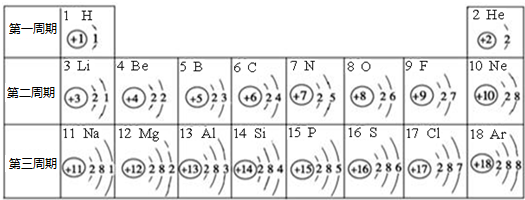问题
填空题
元素周期表是学习化学的重要工具.下面是元素周期表中1~18号元素原子核外电子排布,我们对它进行研究:

(1)第12号元素属于______元素(填“金属”或“非金属”),它的元素名称是:______;它在化学反应中容易______(填“得”或“失”)电子,所形成的微粒的符号:______.
(2)元素的化学性质与原子结构中的______数关系密切.
答案
(1)根据元素周期表可知,第12号元素名称是镁元素,它属于金属元素,它在化学反应中容易失电子,而带两个单位的正电荷,它的离子符号为Mg2+;
(2)原子在相互化合是存在得失电子或形成共用电子对,都与最外层电子数有关,所以元素的化学性质与原子的最外层电子数关系密切.
故答案为:(1)金属;镁;失;Mg2+
(2)最外层电子
